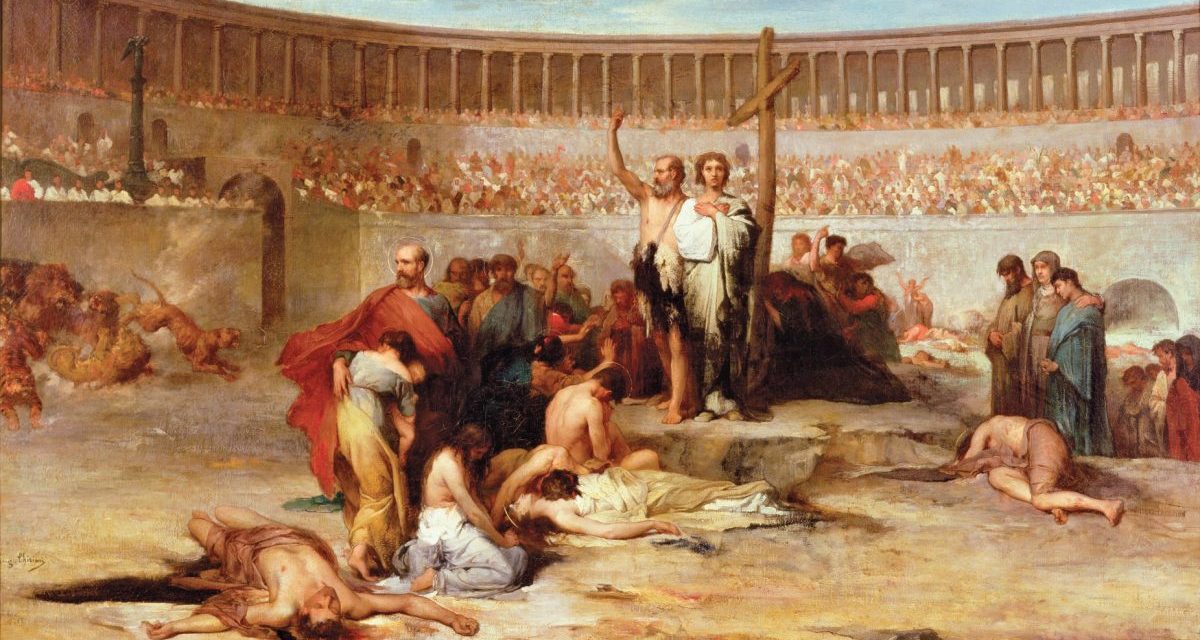The Romans did not know the God that is love, so they did not know love. And they labeled it “hate.”
Each year after celebrating the Solemnity of Sts. Peter and Paul, we follow up their celebration the day after with the feast of the First Martyrs of Rome. This feast honors all those unknown men and women who gave their life in witness to the Christian faith in the first days of the Church. The first martyr of the West was St. Prisca, who was baptized by St. Peter and killed during the reign of Emperor Claudius. But the persecution of the Christians really began with great force under the reign of Nero.
The most famous account of the infamous burning of Rome in A.D. 64 comes from the annals of Tacitus. It’s quite possible that Nero himself was to blame for starting the fire. Whether he did or not, many in Rome believed he was guilty, and Nero needed a scapegoat. He turned to the strange sect that was quickly multiplying in Rome: the followers of Christ.
“In order to stifle the rumor that he had himself set Rome on fire, Nero falsely charged with the guilt and punished with the most fearful tortures the persons commonly called Christians, who were hated for their wicked practices. Christus, the founder of that name, was put to death as a criminal by Pontius Pilate, procurator of Judea, in the reign of Tiberius; but the pernicious superstition, repressed for a time, broke out again, not only through Judea, where the mischief originated, but through the city of Rome also, whither all things horrible and disgraceful flow from all quarters as to a common receptacle where they are encouraged. Accordingly, first those were seized who confessed; next on their information, a vast multitude were convicted, not so much on the charge of burning the city, as of hating the human race.
“In their very deaths they were made the subjects of sport: for they were covered with the hides of wild beasts, and worried to death by dogs, or nailed to crosses, or set fire to, and when the day waned, burned to serve for evening lights. Nero offered his own gardens for the spectacle, and exhibited a Circensian game, indiscriminately mingling with the common people in the dress of a charioteer, or else standing in his chariot. For this cause a feeling of compassion arose toward the sufferers, though guilty and deserving of exemplary capital punishment, because they seemed not to be cut off for the public good, but were victims of the ferocity of one man.” –Tacitus, Annals, XV, 44.
It’s important to note the crime of which the Christians were accused. They were not accused of starting the fire, for there was no proof to stand up in court. Rather, the followers of this “pernicious superstition” were convicted of “hatred of humanity.” Tacitus, no fan of Nero, admits that while Nero’s behavior got out of hand, these followers of “Christus” did indeed deserve to be killed.
Put yourself in the shoes of one of the martyrs we celebrate on this feast of the first Martyrs of Rome. You have sat at the feet of Peter and Paul and listened to stories of Jesus. You have heard the command to love God and love your neighbor. While John hasn’t written his first epistle yet, there’s no doubt that you have heard that God is love. You have committed your life to following a teacher who claimed he was the Son of God, sent into the world because of love (Jn 3:16) and who commanded you, “Love your enemies and pray for those who persecute you” (Mt 5:44).
And now you are being accused of hatred of the human race. A religion of love, accused of hate. Was there a more slanderous charge? And yet perhaps that’s exactly what John was thinking of, years later, when he told us, “See what love the Father has given us, that we should be called children of God; and so we are. The reason the world does not know us is that it did not know him” (1 Jn 3:1).
The Romans did not know the God that is love, so they did not know love. And they labeled it “hate.”
Many people in Rome saw the Christians as joyful, loving people, ready to serve their neighbor at any cost. They realized they were light in a very dark culture of death, promiscuity, and materialism. The faith spread.
But many influential Romans didn’t understand Christianity and only saw them as a threat. Because they didn’t sacrifice to the Roman gods, they were endangering the safety and prosperity of the empire. To the Romans, there was no separation between church and state. If you wanted Rome to flourish, you sacrificed to the Roman gods. Many would have been okay putting Jesus in their pantheon alongside Jupiter and Juno and Vesta. But to worship Him alone? That was just asking for trouble from the other gods.
The Romans believed that the State was the absolute authority and the emperor was supreme, even to the point of worship. Christians, of course, disagreed — not because they weren’t obedient citizens, but because they believed even the emperor was subject to God. They believed in rendering to Caesar what was Caesar’s and they faithfully paid their taxes. They prayed for the emperor, but they refused to pray to him.
The Christians were seen as secretive, because their religious practices were confined to the baptized. Rumors and accusations began to spread about what the Christians believed and did. The Christians didn’t attend the bloody gladiatorial games, they refused to eat food sacrificed to idols, and they lived lives of fidelity in marriage, raising children at a time when abortion and infanticide was common, and refused to engage in deviant sexual practices.
As a result, the Christians in the Roman Empire were viewed as intolerant, close-minded people who practiced a weird religion that was portrayed as an enemy to the State.
Yet these men and women refused to compromise their beliefs. They refused to give up their way of life. Not because they hated. But because they loved.
Sound familiar? Perhaps it’s good for all of us to remember the words of Christ: “If the world hates you, know that it has hated me before it hated you. If you were of the world, the world would love its own; but because you are not of the world, but I chose you out of the world, therefore the world hates you. Remember the word that I said to you, ‘A servant is not greater than his master.’ If they persecuted me, they will persecute you; if they kept my word, they will keep yours also” (John 15:18-20).
First Martyrs of Rome, pray for us!














